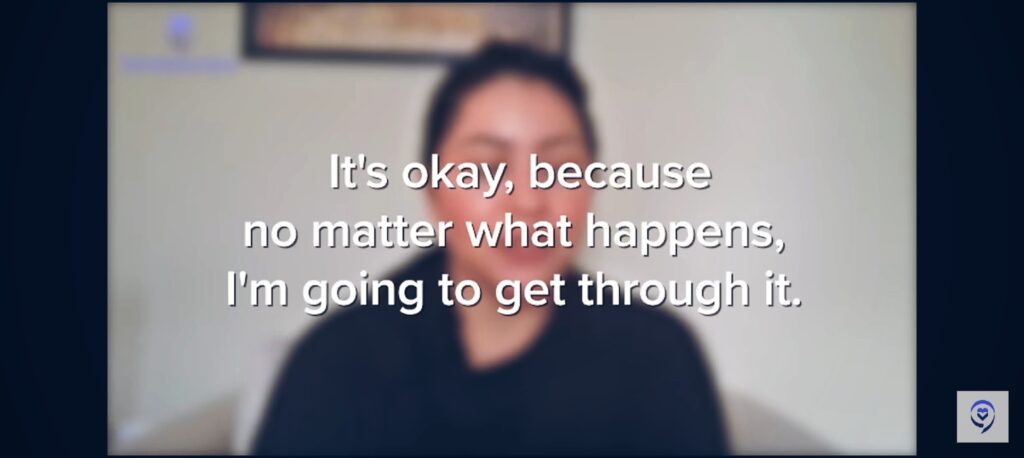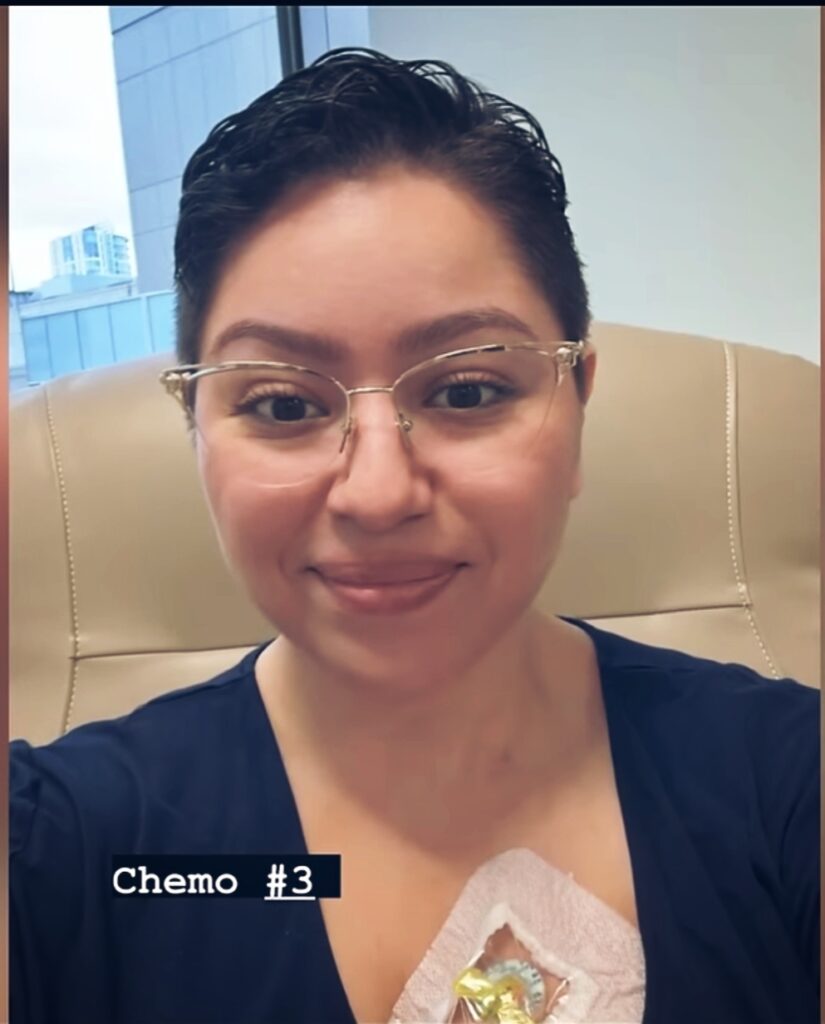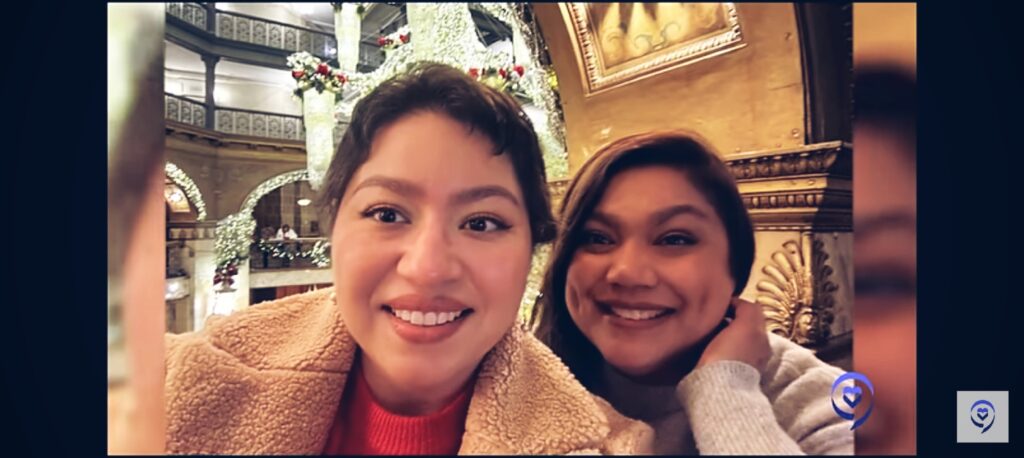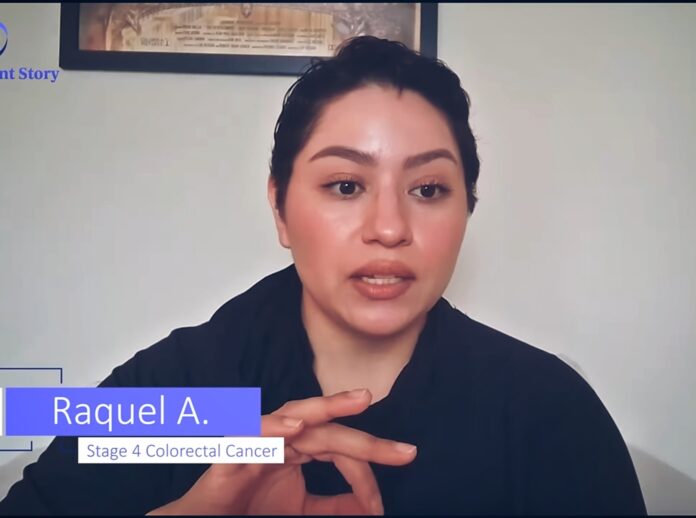Introduction Of Raquel’s Story And Colon Cancer Symptoms
Meet Raquel, A 33 years old young lady who bravely faces colon cancer, Challenging the misconception that colon cancer only occurs in elderly people. Her story is a strong reminder for everyone to stay alert about our health and well-being.
Remember, Colon cancer can affect anyone, and awareness about the symptoms and signs is crucial. For example – Persistent abdominal pain, changes in bowel habits, decrease oral intake and weight loss. Being proactive and seeking medical attention when you are noticing these symptoms can catch the disease (Colony Cancer) early and treatment will be easier and more effective in early stage of cancer, as Raquel did. Her experience is a reminder for everyone that being aware of colon cancer is essential for everyone irrespective of ages, and not just for our grandparents.
Raquel’s Story
Let me introduce you to an extraordinary woman, 33-year-old Raquel, who has shown remarkable strength and resilience in the face of terminal colorectal cancer. Despite this hard challenge, she has accepted life with so much courage, reminding us all of the strength of resilience, optimism, and hope.
In addition to her battle against cancer, she also shines brightly in the tech industry, where she is rocking in her field. Her dedication and passion for her tech work are truly inspiring, and she considers herself immensely blessed to have the opportunity to contribute in the tech field. During her precious spare moments, she finds joy in the simple pleasures of life. And with a deep passion for literature and artistry, she immerses herself in reading and drawing. Through social media, she has created a community of people facing similar challenges in their lives, finding strength in shared experiences.
I didn’t pay much attention to my symptoms because they would come and go.
Raquel’s Wake-Up Call: Colon Cancer Knows No Age Limits
Colon cancer is often seen as an older person’s problem. But Raquel’s story changed that. This lively young woman, right in the middle of her peaceful life, found herself battling stage 4 colorectal cancer. Her journey taught us a strong lesson: signs of colon cancer can show up at any age of life, and noticing them early to rule out colon cancer at the earliest stage is necessary.
In this article, we will explore Raquel’s experience, from the unnoticed symptoms to why catching it early matters so much to evaluate the diagnosis and start treatment at the earliest stage to recover as soon as possible. Whether you are young or you care about someone who is young, Raquel’s story might inspire you to take control of your health.
Pre-diagnosis of colon cancer
Starting signals
Patients often share their stories about the disease, including the signs they noticed early on and how they didn’t realise what they meant at first. Raquel’s experience is a powerful example of why recognising early signs of colon cancer is important, regardless of age. In 2019, Raquel, a young woman in her prime, started symptoms like increased bathroom visits. At that time, she was working in restaurant management, so she thinks this was probably due to eating too much of the foods at work or eating too many processed foods. So she changed her diet, trying to eat healthier and protein-rich foods, and she also started using fibre supplements, which initially seemed to alleviate the symptoms. However, the issue wasn’t permanently resolved. Many people, like Raquel, initially might dismiss these changes as temporary or related to dietary choices. However, what Raquel experienced is a classic example of how early colon cancer symptoms can be subtle and recurrent.
Symptoms became more severe
In 2022, as I mentioned earlier, she was working in the tech industry. And one of the friends from the industry noticed that she was going to the bathroom too frequently. She asked her about this, and Raquel replied, “Yes, I am fine. Maybe it is the dairy product in my coffee, or maybe I have a gluten sensitivity.” At that time, she ignored her symptoms, and hence, her symptoms got worse day by day.
Then, after she started symptoms such as frequent bowel movements and pin-thin stools, sometimes she also experienced blood in her stool. But she also started to experience a sign that she was getting full immediately after even eating a small amount of food. Every time I took a bite of something, I immediately felt full and bloated. She added.
One of the challenges in diagnosis of colon cancer at the early stages is that the symptoms can sometimes be subtle or come and go. Also, she experienced persistent bloating stomach with noticeably hard rounded stomach. These are two important signs of colon cancer. Also signs like getting full quickly, unexplained weight loss, especially with a healthy diet, can be a red flag that something was wrong.
One of the challenges in diagnosing colon cancer early is that the symptoms can sometimes be subtle or come and go, as Raquel describes. In her case, even while actively dieting and eating healthily, she wasn’t seeing weight loss, which she found concerning. Additionally, she experienced persistent bloating with a noticeably hard, rounded stomach.These are both important observations. While dieting doesn’t always guarantee immediate weight loss, an unexplained plateau, especially with a healthy diet, can be a red flag. Similarly, persistent bloating, especially if accompanied by a change in abdominal shape, warrants investigation.
Symptoms neglected by Primary Care Doctor
As a doctor, we have encountered many patients over the years, each with their own unique stories of diagnosis, management of the disease, and health challenges. Among them, one patient experience stands out: “Raquel Story.” A young woman, when she first consulted a primary care physician to know about the diagnosis and treatment of her symptoms, especially bowel symptoms, bloated stomach, and abdominal pain, primary care physician doctor thought it was in her head. So her doctor scheduled a psychiatrist appointment for her because the doctor thought it was in her thoughts and she had anxiety. But now that she knows so much about colorectal cancer disease, she knows that they are classic colorectal symptoms, especially her bowel symptoms.
How Was Raquel Diagnosed with Colorectal Cancer?

Raquel was diagnosed with colorectal cancer in the emergency room. Raquel went to the ER as she had severe abdominal pain that was spreading to her lower back, and she almost fainted in her apartment. After that, she became more worried about her health and went to the ER for a check-up. The emergency doctor suggested all routine blood investigations, and they also included cancer markers, i.e., CEA, CA 19, CA 125. And sadly, her cancer marker levels are elevated in the report; her CEA levels alone were 700s and anything above 30 is already a sign of cancer in the human body. Too much elevation in the cancer reports means her cancer was advanced (stage 4). When she was in the ER room, the doctor examined her carefully and seriously, which is why her cancer was diagnosed, Raquel stated. And after the blood test, they suggested an MRI, CT scan, and ultrasound to look more deeply into that.
Raquel colon cancer symptoms (Colorectal Cancer Symptoms)
Colon cancer can develop without any noticeable symptoms. When symptoms do emerge, they can often be mistaken for less serious conditions. If you’re experiencing symptoms, there’s a high likelihood that you may be unsure if they are indicative of colon cancer, as these symptoms often resemble those of less severe conditions.
Here I have listed the common symptoms of colorectal cancer
Change in Bowel Habits
Persistent diarrhea, constipation, or narrowing of the stool that lasts for more than a few days.
Rectal Bleeding or blood in your stool (poop)
Consult your Doctor if you notice blood in the toilet after your poop or after wiping, or if your stool looks black, dark red or red. It’s important to remember that blood in the stool not always necessary means you have colon cancer. Other disease like anal fissure, hemorrhoids, intestinal ulcers, can also cause change in stool color. Foods can also cause red stool like beets. But it’s better to consult a doctor if you notice red color stool. Blood in your stool, which could be indicative of colon cancer, may present as:
Bleeding from Tumors
Colorectal cancer frequently causes bleeding within the digestive tract. And this bleed may be visible in the stool, making it appear black, reddish, or darker in color. But sometimes the stool looks normal and invisible to the naked eye. Over time, this bleeding may lead to anaemia (a low haemoglobin level in the blood).
Anemia Indicator
Sometimes, the first sign of colorectal cancer is a blood test showing low haemoglobin and red blood cell counts. Patients remain asymptomatic, but low haemoglobin levels and the presence of blood in the stool may indicate the need to investigate for colon cancer.
Not Always Alarming
However, it’s important to note that blood in stool or after stool not always necessarily means you have colon cancer. Less serious illnesses or minor issues like anal fissure, hard stool, constipation, and hemorrhoids can also cause rectal bleeding.
Remember, if you experience rectal bleeding, especially if you are over 45 years old, or if symptoms persist despite treatment, it’s important to consult a doctor for proper evaluation, diagnosis, and treatment.
Abdominal Pain
Colon cancer can present with various symptoms, and abdominal pain is one of them. This pain, described as cramping and persistent aching, may vary in intensity and location. It can be accompanied by other gastrointestinal issues such as gas, bloating, or changes in bowel habits. Abdominal pain has to be ruled out as a potential symptom of colon cancer if other risk factors are present, such as age above 40 years, changes in bowel habits, or a distended abdomen.
Feeling of Incomplete Bowel Emptying or diarrhoea
You may experience changes in bowel habits, such as constipation or diarrhea that persist despite symptomatic treatment. You may notice alterations in the consistency or size of your bowel movements. Some individuals may feel a sense of incomplete bowel movements or unsatisfactory bowel habits, or they may experience urgency to pass stools even after having emptied their bowel.
Weakness and Fatigue
Weakness, fatigue, shortness of breath are symptoms of Anemia. As anemia can occur in colon cancer due to bleeding in stool.
Unintended Weight Loss
You may experience a noticeable drop in your body weight that occurs unintentionally, without any deliberate efforts to lose weigh. This may occur because of changes in bowel habits, decrease food intake and disturbance in digestion.
Vomiting
If you have been vomiting persistently without knowing the cause, consult your doctor to investigate further. Your doctor will examine you and suggest tests accordingly, and will provide you with a treatment plan. They may also suggest cancer screening if there is suspicion.
Bloated Belly (Stomach)
Colon cancer can lead to disturbances in the gastrointestinal tract, resulting in changes in bowel habits. These changes may cause bloating of the stomach, cramping, abdominal pain, or, in advanced cases of colon cancer, fluid retention. Consult your doctor if your bloated stomach persist for one week or more. Or if you experience other symptoms of colon cancer such as vomiting, blood in stool etc.
How Did She React to the Diagnosis?
When she received her colon cancer diagnosis, her reaction surprised everyone, including the doctors present. Instead of crying, she remained calm and logical. The doctor said to her, “Raquel, you’re not even crying. I’m so sorry I’m not giving you any good news.” To which she replied, “Doctor, you know what? It’s okay because no matter what happens to me, I will get through it.” She felt so confident that “whether I can heal from this or not, I will be able to handle it well. I have overcome other things in my life, and I hope that I can be an inspiration to people who are struggling with the same thing,” she added.
Treatment

Raquel’s experience highlights the importance of individualised treatment plans in colon cancer. The treatment plan and how they approach to your diagnosis depends on your hospital, A discussion between patient and doctor is important to determine the most appropriate course of action. When Raquel was first diagnosed, she was admitted in different hospital due to her insurance policies, she had to switch to a different hospital. Her treatment plan would have been a little different if she stayed with the first hospital because they wanted to do surgery right away. But then when she shifted to a different hospital, they said “we are going to start with chemotherapy.lets see how chemothrepy react and then we will talk about surgery.”
Different Treatment Options Available for Colon Cancer
Surgery is the common colorectal cancer treatment. There are lot of colon cancer surgeries available
Polypectomy
A polypectomy is a medical procedure to remove polyp-type cancer growth inside the colon. During a colonoscopy, if polyps are detected, a polypectomy surgery is performed to remove them. The removed tissue is then sent to the lab for testing to determine if the growths are cancerous or benign.
Partial colectomy
A partial colectomy is a surgical procedure to remove part of the colon. This surgery, also known as resection surgery, involves removing the section of the colon that contains the malignant cancer tumor, as well as some surrounding healthy tissues. After removing the section of the intestine containing the tumor, the surgeon then reconnects the healthy colon sections through an anastomosis (a procedure by which the surgery reconnects the healthy gut). This surgery is commonly performed to treat conditions such as colon cancer, diverticulitis, or blockage in the intestine.
Surgical resection with colostomy
This surgery is similar to a colectomy, where surgeons remove the section of your colon that contains a tumor. However, in this procedure, they cannot connect healthy colon sections. Instead, they create a colostomy. Now you may ask, what is a colostomy? In this procedure, the doctor redirects the colon to an opening in your abdominal wall, allowing stool to be collected in a bag that is attached externally. This procedure is used when direct reconnection of the colon is not possible or is deemed risky.
Radiofrequency ablation (RFA)
Radiofrequency ablation is a common method used to treat cancer that has spread to the liver. In this surgical procedure, high-energy radio waves are used to kill the cancer cells. A CT scan or ultrasound guides a needle-like probe inserted through the skin into the tumor. After that, an electric current is sent to the tip of the probe, which releases high-frequency radio waves that heat the tumor and destroy cancer cells.
Doctors may give you a combination of treatment with adjuvant therapy. This can be given before or after surgery. Doctors may be adjuvant therapy only as a prophylaxis or when surgery is contraindicated. Adjuvant therapy may include:
Chemotherapy
Chemotherapy is a common treatment for colon cancer. It works by destroying rapidly growing cancer cells. In chemotherapy, the most common drug used is 5-Fluorouracil (5-FU).
Targeted therapy
Targeted therapy is a specialised approach in colon cancer treatment that focuses on specific molecules or pathways involved in the tumor growth.
Raquel’s Story: Being on Chemotherapy for Life
She first started with oxaliplatin. But after that, she started experiencing side effects of the drug, such as neuropathy. Then, the doctor stopped that drug in December. She was on oxaliplatin for 6 months until the side effects began. Then she switched to 5-FU (5-Fluorouracil) and irinotecan. The reason for starting irinotecan was to see if it would help her with liver metastases. After starting that treatment, her liver and lungs didn’t respond to chemo, but the metastases in her ovaries and colon responded well.

As of right now, I don’t have a choice, as chemotherapy is keeping me alive. I am going to continue being on it bi-weekly. 50% of affected people who have chemotherapy might need GRANIX shots. Raquel said in an interview.
Raquel’s story is a powerful reminder that colon cancer can affect a person at any age. This story alerts us to recognize early signs, such as changes in bowel habits, blood in stool, distended abdomen (belly), ascites (fluids in the abdomen), or unexplained weight loss. If your symptoms persist even after initial treatment, seek medical attention, even if you think the symptoms are mild.
Remember, early diagnosis and treatment are important for successful and effective treatment. Furthermore, Raquel’s journey highlights the importance of individualized treatment plans and open communication with your doctor. By recognizing symptoms early to diagnose at an early stage and by understanding your treatment options and working with the doctor’s team, you can make informed decisions about your treatment plans. Let Raquel’s story inspire you to take care of your health and diagnose early without ignoring symptoms you are experiencing. Schedule regular checkups, maintain a healthy lifestyle, and be aware of potential warning signs.
If you want to read more about colon cancer, you can visit these official websites
Refrence





